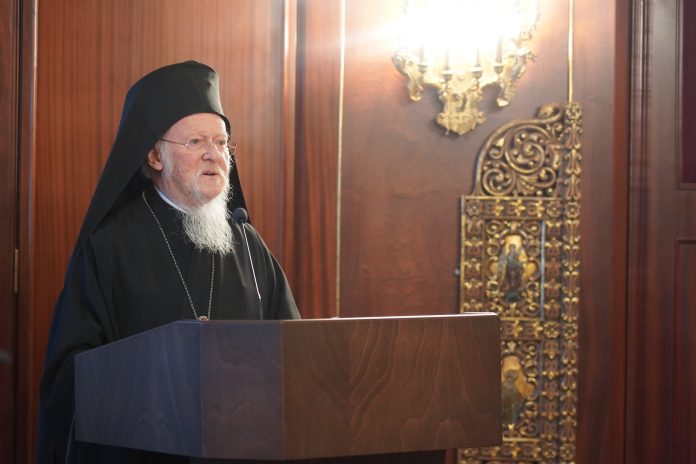ΟΙΚΟΥΜΕΝΙΚΟΝ ΠΑΤΡΙΑΡΧΕΙΟΝ
Η Α.Θ. Παναγιότης ο Οικουμενικός Πατριάρχης κ.κ. Βαρθολομαίος, το απόγευμα της Παρασκευής, 6 Οκτωβρίου 2023, στο Φανάρι, κήρυξε την έναρξη Διεθνούς Συμποσίου με τίτλο «Κωνσταντινούπολη και Μτσχέτα – Εκκλησιαστικές και Πολιτιστικές Αλληλεπιδράσεις».
Στην ομιλία του ο Παναγιώτατος αναφέρθηκε στις μακραίωνας σχέσεις ανάμεσα στην αρχαίες πόλεις της Κωνσταντινουπόλεως και της Μτσχέτας, και τις Εκκλησίες τους. Υπενθύμισε δε, ότι πολύ αργότερα, κατά τον 20ο αιώνα, Ορθόδοξοι Χριστιανοί από την Γεωργία που ζούσαν στη Δυτική Ευρώπη βρήκαν καταφύγιο στη δικαιοδοσία του Οικουμενικού Πατριαρχείου, το οποίο ίδρυσε την πρώτη Γεωργιανή ενορία στην Ευρώπη αφιερωμένη στην Αγία Ισαπόστολο Νίνα, την φωτίστρια του Γεωργιανού λαού. Επεσήμανε, επίσης, ότι το επιστέγασμα των ευλογημένων δεσμών και καλών σχέσεων μεταξύ των δύο Εκκλησιών ήταν η παραχώρηση αυτοκεφαλίας στη Γεωργιανή Εκκλησία από το Οικουμενικό Πατριαρχείο και της Πατριαρχικής αξίας στον Προκαθήμενό της, το 1990, σε αναγνώριση της ανεκτίμητης και διαχρονικής προσφοράς της προς την Ορθοδοξία και προς τον γεωργιανό λαό.
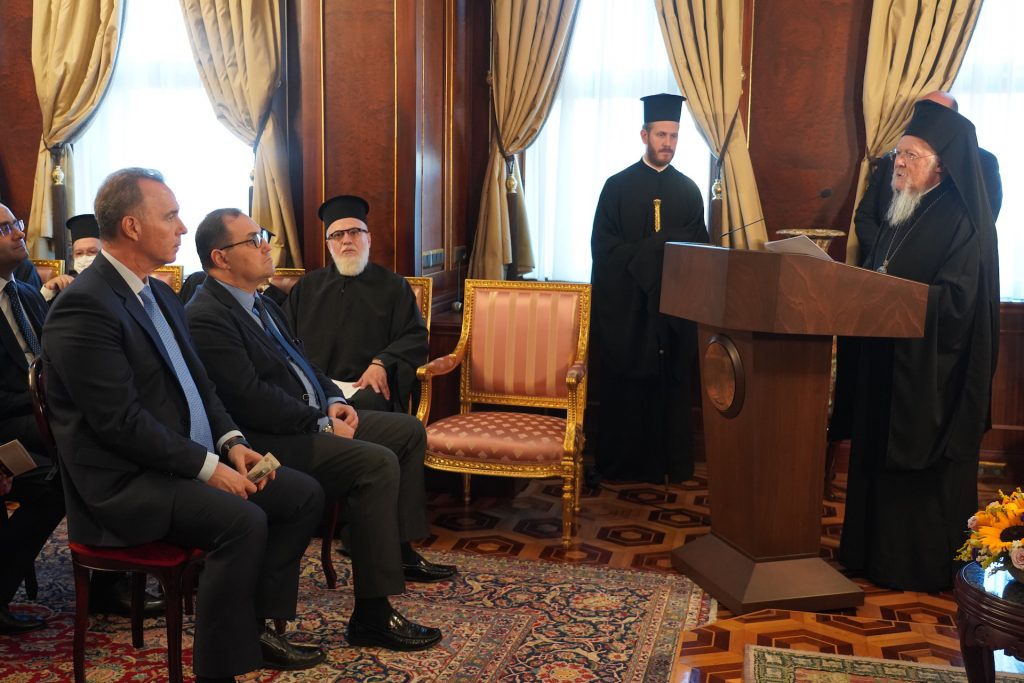
Αναφερόμενος στον καθοριστικό ρόλο που διαδραμάτισαν στη διαδικασία αυτή τόσο ο αοίδιμος προκάτοχός του, Πατριάρχης Δημήτριος, όσο και ο Μακ. Καθολικός Πατριάρχης Γεωργίας κ. Ηλίας Β’, ο Παναγιώτατος εξέφρασε την χαρά του που και ο ίδιος συμμετείχε άμεσα σε αυτή τη διαδικασία, έχοντας επισκεφθεί τη Μτσχέτα πολλές φορές, τονίζοντας ότι παραμένει προσηλωμένος στην ενίσχυση και την προώθηση της εν Χριστώ αγάπης μεταξύ των δύο εκκλησιών.
Στην έναρξη του Συμποσίου, που τέθηκε υπό την αιγίδα του Οικουμενικού Πατριαρχείου και διοργανώθηκε από την Γεωργιανόφωνη Κοινότητα της Πόλεως, παρέστησαν Ιεράρχες, κληρικοί, ο Εξοχ. Πρέσβης της Γεωργίας στην Τουρκία, οι Εντιμ. Γενικοί Πρόξενοι της Ελλάδος και της Γεωργίας στην Πόλη, Καθηγητές, ερευνητές και άλλοι διακεκριμένοι επιστήμονες.
Στις εργασίες του, που πραγματοποιήθηκαν το Σάββατο στην Ι. Θεολογική Σχολή της Χάλκης, μίλησαν, μεταξύ άλλων, οι Σεβ. Μητροπολίτες Γέρων Χαλκηδόνος κ. Εμμανουήλ και Κρήνης κ. Κύριλλος, Έξαρχος Μελίτης και Πανεπιστημιακός Καθηγητής, καθώς και ο Σεβ. Αρχιεπίσκοπος Ντμανίσι και Άγαρα-Τασιρίσις κ. Ζήνων, εκ του Πατριαρχείου Γεωργίας.
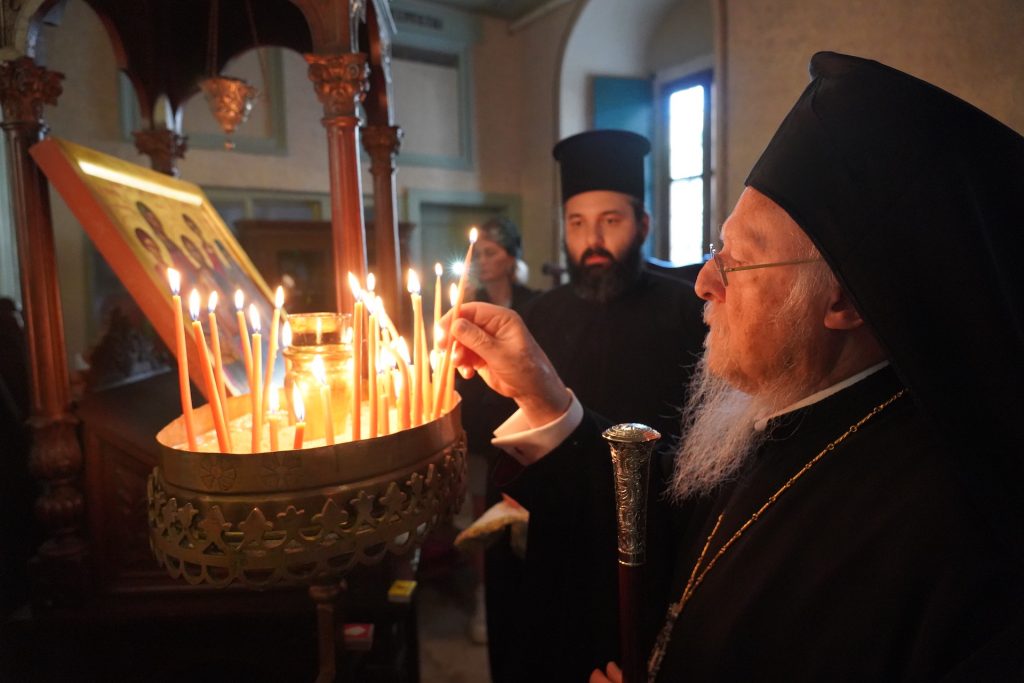
“Οι σχέσεις των Εκκλησιών Κωνσταντινουπόλεως και Γεωργίας είναι και θα παραμείνουν πάντοτε στενές και αδελφικές”
Την Κυριακή, 8 Οκτωβρίου, ο Παναγιώτατος παρέστη συμπροσευχόμενος στη Θ. Λειτουργία, που τέλεσε ο Σεβ. Αρχιεπίσκοπος Ντμανίσι και Άγαρα-Τασιρίσις κ. Ζήνων, στον Ι. Ναό Αγίου Γεωργίου Πύλης Αδριανουπόλεως, της Γεωργιανοφώνου Κοινότητος της Αγιωτάτης Αρχιεπισκοπής Κωνσταντινουπόλεως.
Στην σύντομη ομιλία του, αμέσως μετά, ο Παναγιώτατος εξέφρασε την χαρά του που για ακόμη μία φορά βρέθηκε κοντά στο Γεωργιανόφωνο ποίμνιο του Πατριαρχείου στην Πόλη.
Με αφορμή το διοργανωθέν Συμπόσιο, που αφορούσε στις σχέσεις, διά μέσω των αιώνων, μεταξύ των ιστορικών Εκκλησιών Κωνσταντινουπόλεως και Γεωργίας, ο Πατριάρχης υπογράμμισε ότι, “αυτές οι σχέσεις είναι και σήμερα και θα παραμείνουν πάντοτε στενές και αδελφικές”, και υπενθύμισε ότι επισκέφθηκε πολλές φορές τη Γεωργία και πάντοτε θαύμαζε την ευσέβεια του Γεωργιανού λαού, καθώς και τη μεγάλη προσωπικότητα του Καθολικού Πατριάρχου κ. Ηλία Β’, ο οποίος, όπως είπε, αποτελεί σύμβολο της εθνικής ενότητος και της ευσεβείας του Γεωργιανού λαού. “Τον αγαπούμε και τον σεβόμεθα και του στέλνουμε σήμερα όλοι μαζί, τα σέβη μας και τις ευχές μας για υγεία και μακροημέρευση”, πρόσθεσε ο Οικουμενικός Πατριάρχης, ενώ σε άλλο σημείο της ομιλίας του εξέφρασε την Πατριαρχική του ευαρέσκεια για το έργο του Πανοσιολ. Αρχιμανδρίτη του Οικουμενικού Θρόνου κ. Ηλία Τζιντζολάβα, Ιερατικώς Προϊσταμένου της Γεωργιοφώνου Κοινότητος της Πόλεως.
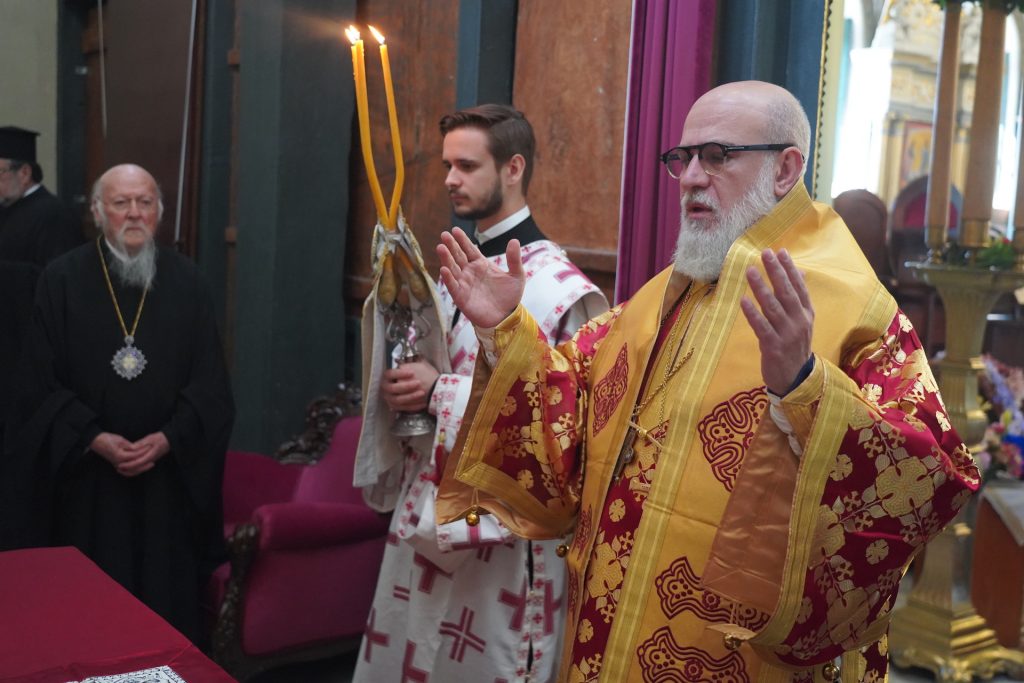
Προηγουμένως, ο Σεβ. Αρχιεπίσκοπος Ντμανίσι και Άγαρα-Τασιρίσις κ. Ζήνων, στην προσφώνηση του τόνισε ότι η Εκκλησία της Κωνσταντινουπόλεως στάθηκε πάντοτε, σε δύσκολες στιγμές, στο πλευρό της Εκκλησίας της Γεωργίας. “Σε οποιαδήποτε στιγμή, ό,τι και να συνέβαινε στην Εκκλησία μας, πάντοτε ο Παναγιώτατος Βαρθολομαίος ήταν δίπλα μας, όπως και όλη η Εκκλησία της Κωνσταντινουπόλεως”, είπε ο Αρχιεπίσκοπος κ. Ζήνων.
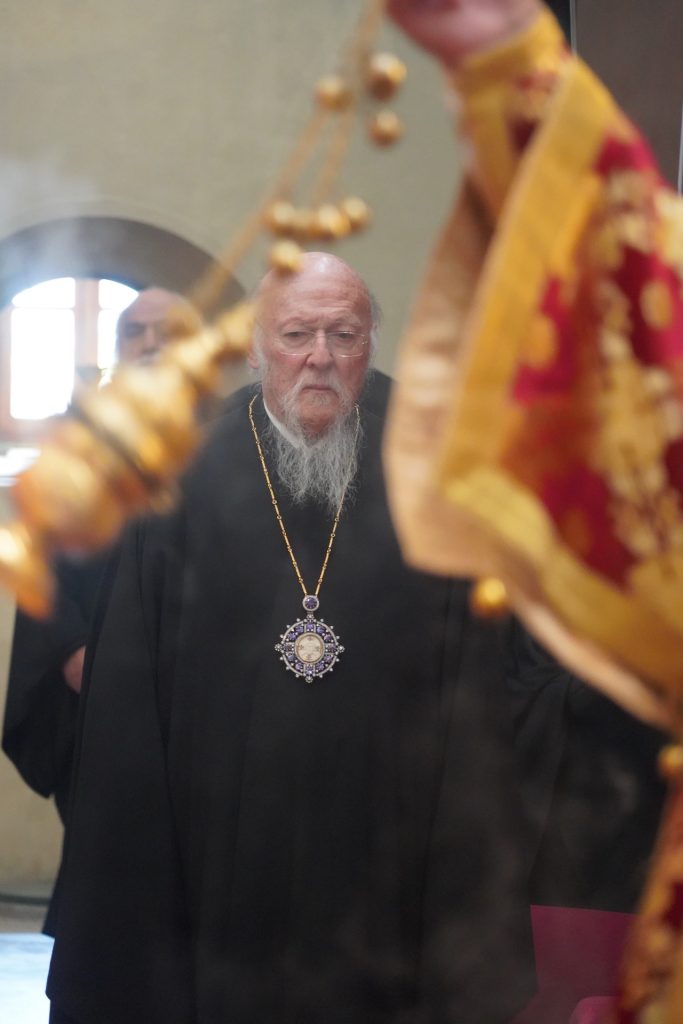
Εκκλησιάστηκαν οι Αρχιερείς Σεβ. Μιλήτου κ. Απόστολος, Μπουένος Άιρες κ. Ιωσήφ, Αυστραλίας κ. Μακάριος, οι Θεοφιλ. Αλικαρνασσού κ. Αδριανός, Επόπτης της Περιφερείας Φαναρίου-Κερατίου Κόλπου, και Αβύδου κ. Γρηγόριος, ο Εντιμ. Γενικός Πρόξενος της Γεωργίας στην Πόλη, ο Κοσμήτορας της Ιατρικής Σχολής του Αριστοτελείου Πανεπιστημίου Θεσσαλονίκης Ελλογιμ. κ. Θεόδωρος Δαρδαβέσης και ο Πρόεδρος του Ιατρικού Συλλόγου Θεσσαλονίκης Εντιμ. κ. Νικόλαος Νίτσας, με τα μέλη του Δ.Σ., καθώς και πλήθος Γεωργιανών πιστών από την Πόλη και προσκυνητών από το εξωτερικό.
Το μεσημέρι, ο Παναγιώτατος ευλόγησε την τράπεζα που παρετέθη στην Κοινοτική Αίθουσα, και στην οποία προσεκάλεσε τον ευρισκόμενο στην Πόλη Σεβ. Καρδινάλιο Κούρτ Κοχ με την τιμία συνοδεία του.
Φωτό: Νίκος Παπαχρήστου
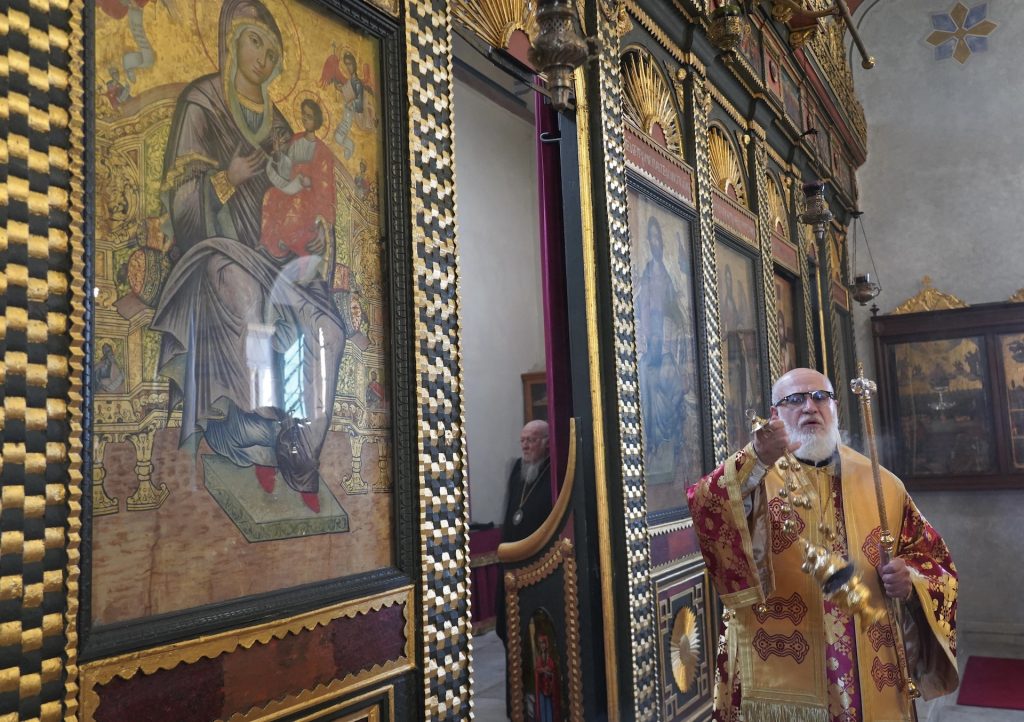
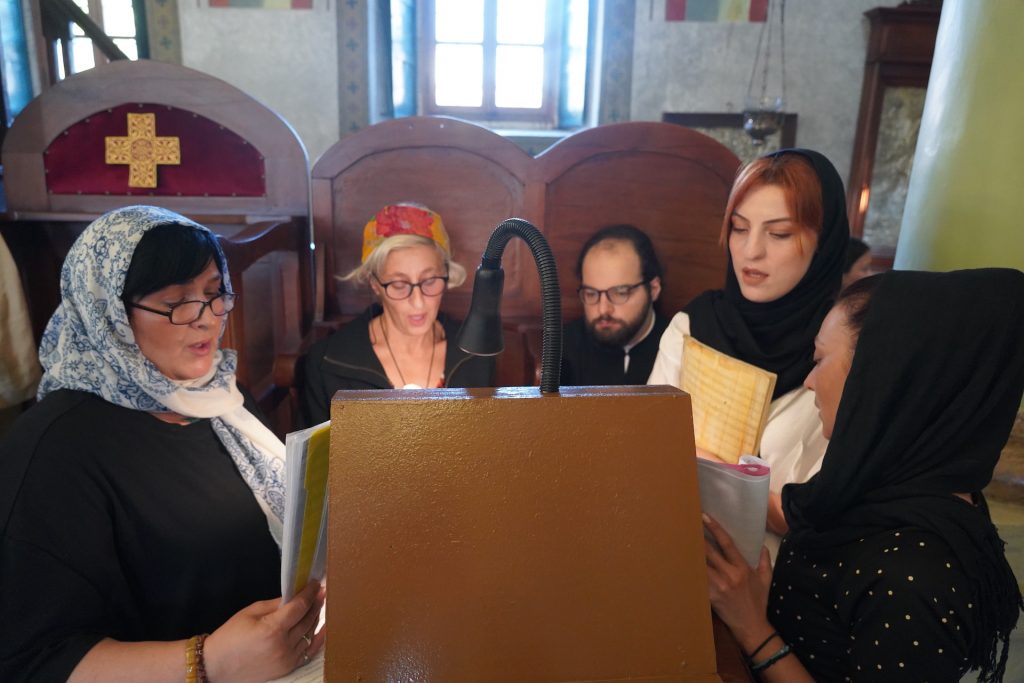
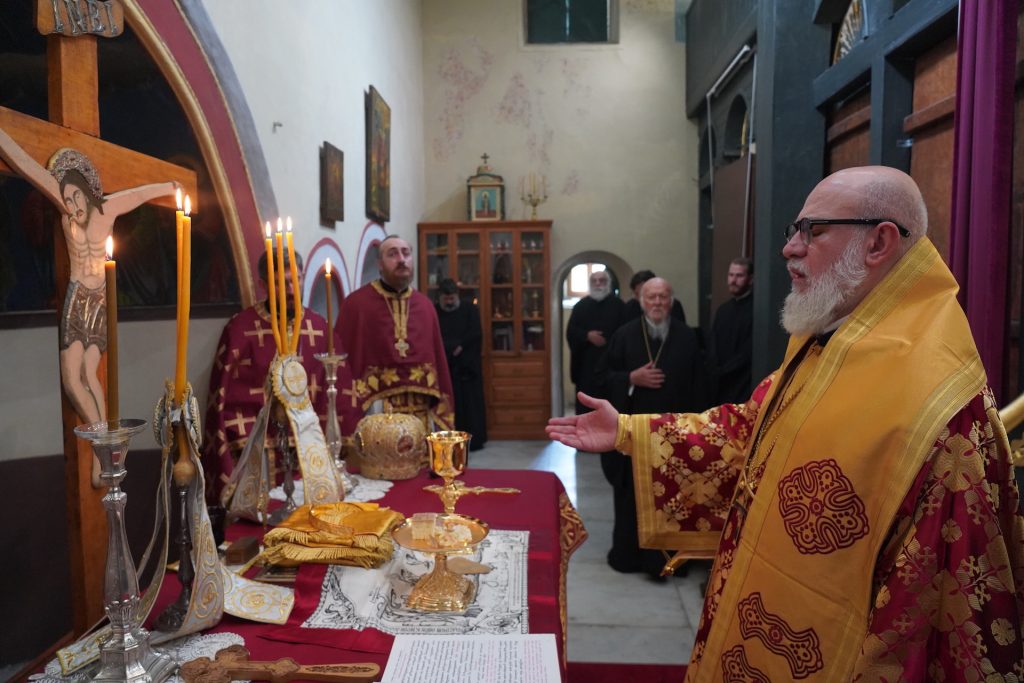
The Opening Speech of His All-Holiness Ecumenical Patriarch Bartholomew, at the International Symposium “Constantinople and Mtskheta – Ecclesiastical and Cultural Interactions” (6 October 2023, Phanar)
Your Eminences,
Distinguished Participants,
We welcome you to the International Symposium titled “Constantinople and Mtskheta – Ecclesiastical and Cultural Interactions”. This congress, under the patronage of the Ecumenical Patriarchate and organized by the Georgian-speaking Parish of Constantinople, is an important initiative. We hope that remembering the centuries-old relations between the two ancient sees of Constantinople and Mtskheta, both founded by the Apostle Andrew the First, and cultivating theological and academic understanding of these events, will unveil new dimensions, needs and requirements of this relationship.
Centuries before the birth of Christ, Byzantium was a small city founded by the Greeks on the shores of the Golden Horn. It was established as the new Rome, renamed Constantinople and made the capital of the Roman Empire in the east around 330AD on the initiative of the first Christian emperor of Rome, St. Constantine the Great. This city united the cultures of the East and the West and connected Europe and Asia just as, centuries earlier, the city of Mtskheta, established by Georgians at the confluence of the Mtkvari and Aragvi rivers, had bridged European and Asian cultures in the Caucasus region. Mtskheta later became the Christian and cultural hub of the nation during the reign of the first Christian Georgian king, Mirian III.
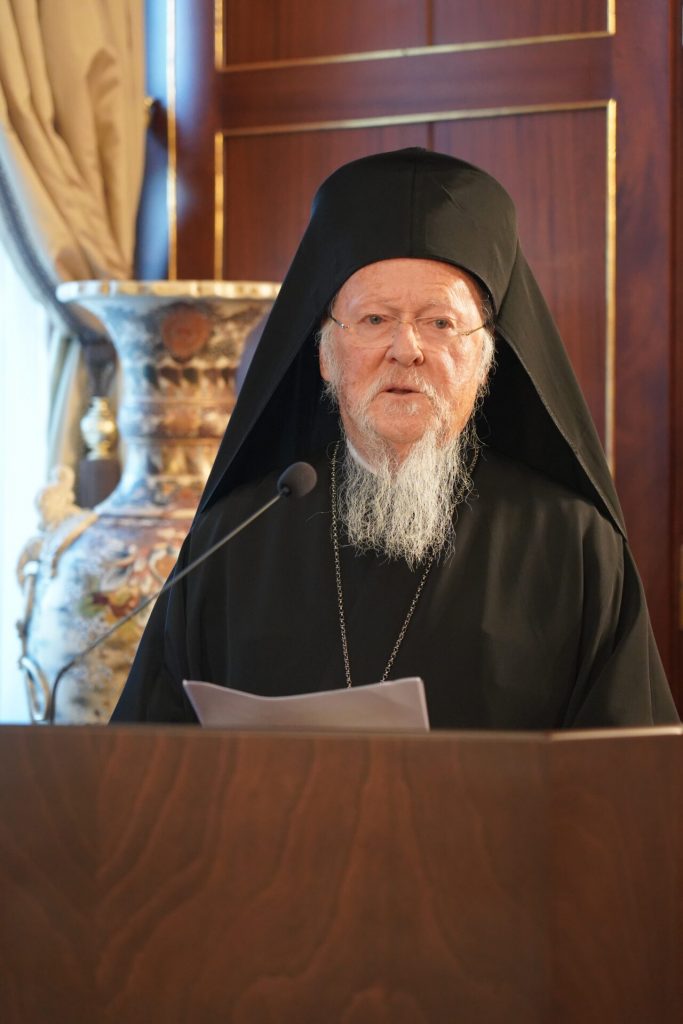
The people of Georgia are one of the most ancient Christian peoples, and preserved their Orthodox identity and loyalty in its apostolic and patriarchal roots and traditions. The Church of Georgia preserved and cultivated strong and unbreakable ties with the Church of Constantinople, which supported it in all its trials and times of trouble, not only during the Byzantine period, but also up until today.
Constantinople, as a political, religious and educational center, exerted a magnetic pull on Mtskheta, and the religious and cultural links that began in the fourth century reached their zenith in the tenth century. With the blessing and support of the primates of the churches of Constantinople and Mtskheta, many Georgian monasteries and educational centers were founded on Mount Athos, on Mount Olympus in Bithynia, in Bachkovo/Petritsoni Monastery and various other large cities and religious-cultural centers under the jurisdiction of the Church of Constantinople, where the texts of the Holy Scriptures and theological texts were translated and edited from Greek into Georgian, enriching Georgian literature.
At the beginning of the 20th century, Georgian Christians living in Western European countries found refuge in the jurisdiction of the Ecumenical Patriarchate. The Church of Constantinople established Europe’s first Georgian parish, named after St. Nino, Equal to the Apostles and Enlightener of the Georgian people, and ordained the Georgian scholar Grigol Feradze, who, due to the communist government in Georgia, was compelled to stay in Europe. He was a priest and ultimately finished his ministry in the Auschwitz concentration camp with self-sacrifice and martyrdom for his fellow man. In recognition of Archimandrite Grigol Feradze’s merits, canonized by the See of Mtskheta, the Holy and Sacred Synod of the Ecumenical Patriarchate decided that the Georgian-speaking parish of Constantinople should celebrate the feast day of St. Grigol.
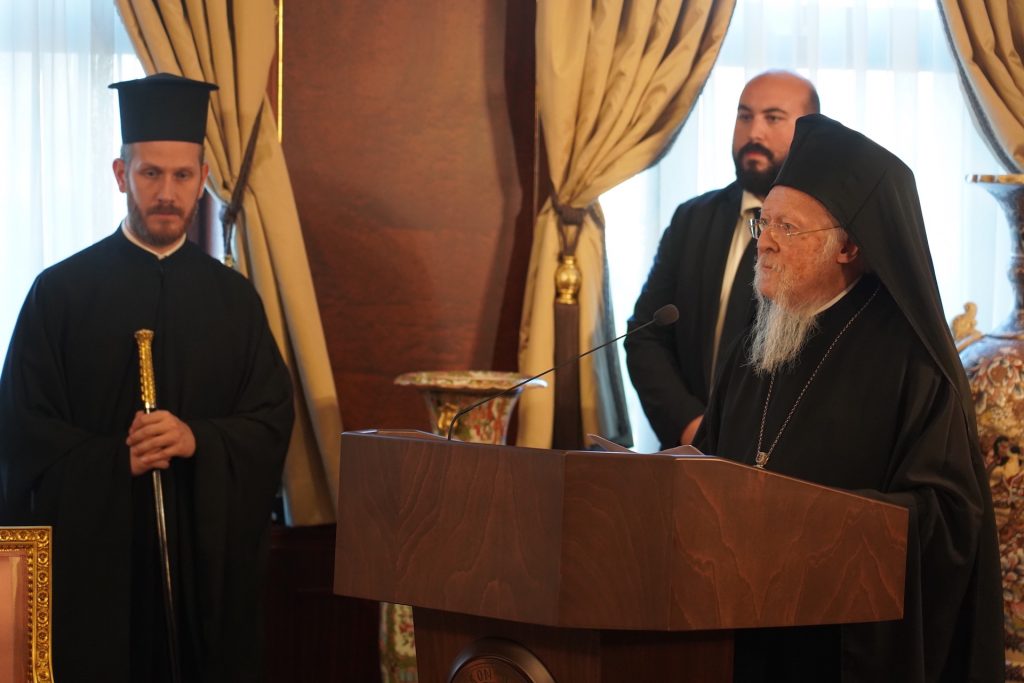
The crowning achievement of the blessed ties and good relations between the two churches was the granting of autocephaly to the Georgian church by the Ecumenical Patriarchate and Patriarchal dignity to its Primate in 1990, in recognition of the invaluable contribution of the Georgian church to Orthodoxy and to the Georgian people throughout the course of history. This canonical initiative and action of the Great Church is a confirmation of the stability and prestige of the Georgian Church, both across Orthodoxy and Christianity. It is important to note that both our predecessor, Patriarch Dimitrios, and our brother in Christ, the Catholicos-Patriarch of Georgia, Ilia II, played significant roles in this process. We are glad to have been directly involved in this process, having visited Mtskheta many times, and we remain committed to the strengthening and reconstruction of Christ-like love between our churches.
Every visit to the church of Georgia was a profound experience for us, a pilgrimage and liturgical strengthening through the many sincere manifestations of honor and love for our humble person, and devotion and respect for the Church of Constantinople.
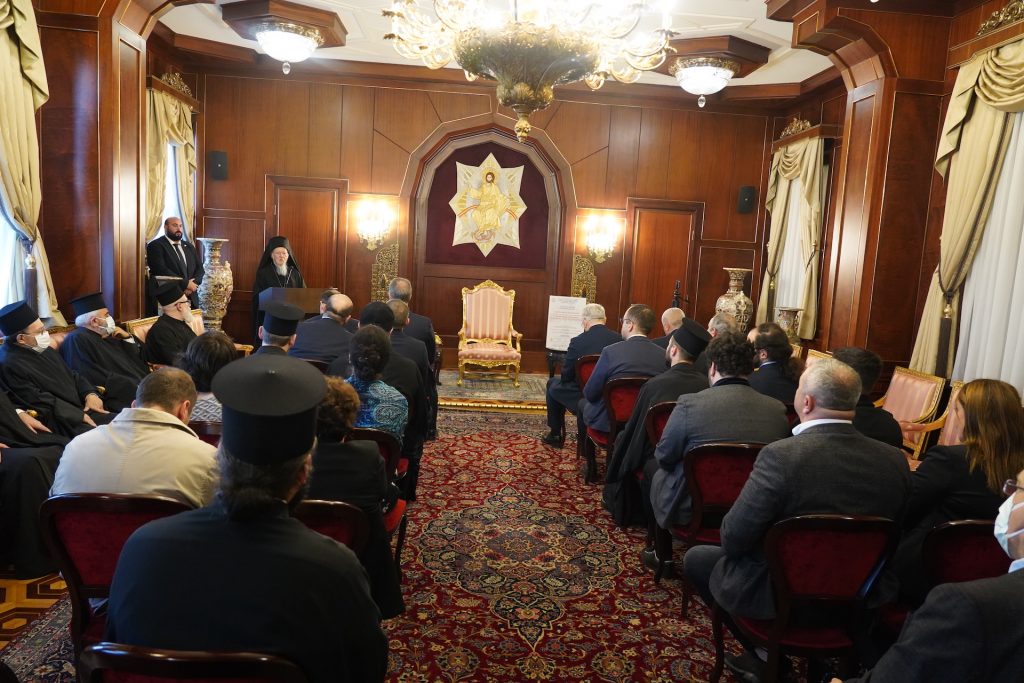
We send a fraternal greeting of love in the Lord and honor from our venerable See to our brother, His Beatitude Patriarch Ilia II of Georgia, and to the blessed multitude of the Church of Georgia. Faithfulness to Orthodoxy has been beneficial for saving the identity of the Georgian people, because from it springs creativity, an ethos of freedom, trust in the future, and hope. With this, problems can be resolved through honest dialogue in a spirit of solidarity and mutual trust. There are no easy solutions, but there is hope and perspective, especially when we believe that the Lord of history is Christ, the Prince of peace.
We anticipate that these topics will be discussed at this symposium, and we would like to confirm our love and respect to you once again and hope that such meetings and events will renew historical memory, contribute to the deepening of Byzantine and Georgian studies, and strengthen the unity between churches and peoples.
Finally, we pray for every blessing from above for the Georgian-speaking parish and community in the City, and we are able to assure you once again of the support and the constant care of the Ecumenical Throne and of ourselves personally for its good progress ahead.
May the grace of our Lord Jesus Christ, the love of God the Father, and the communion of the Holy Spirit be with all of you. Amen!
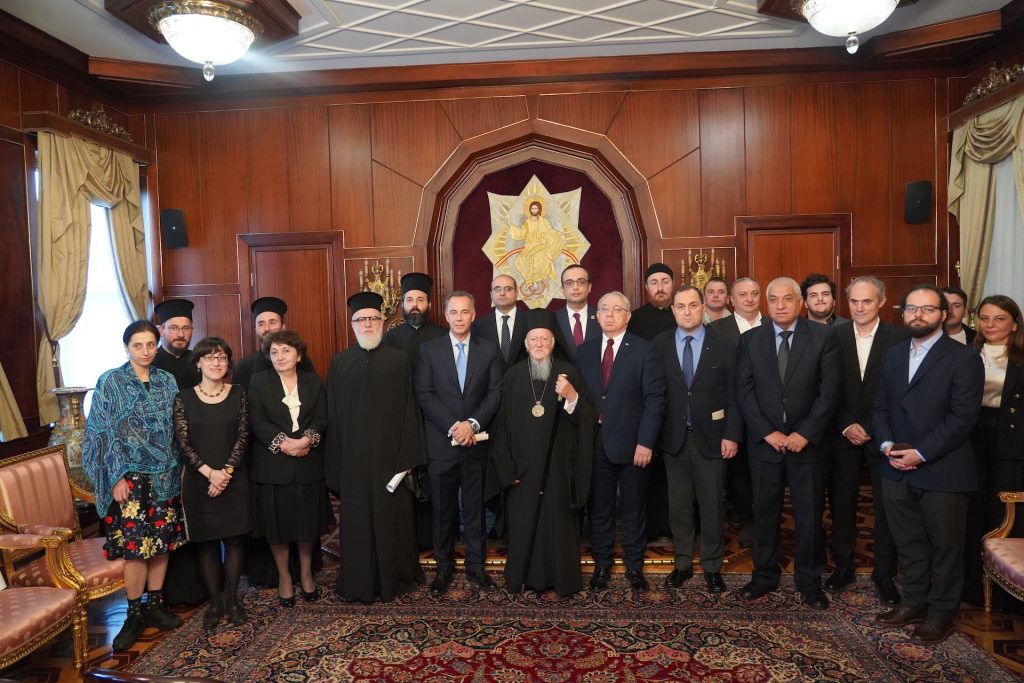
Ο Οικουμενικός Πατριάρχης στα επίσημα εγκαίνια του νεοανεγερθέντος Συροϊακωβιτικού Ναού στο προάστιο του Αγίου Στεφάνου της Πόλεως
Η Α.Θ. Παναγιότης ο Οικουμενικός Πατριάρχης κ.κ. Βαρθολομαίος παρέστη, κατόπιν προσκλήσεως του Σεβ. Μητροπολίτη των Συροϊακωβιτών της Πόλεως κ. Γιουσούφ Τσετίν, στα επίσημα εγκαίνια του νεοανεγερθέντος Συροϊακωβιτικού Ναού του Αγίου Εφραίμ, στο προάστιο του Αγίου Στεφάνου, ο οποίος αποτελεί τον πρώτο Χριστιανικό Ναό που ανεγείρεται εκ βάθρων στην Τουρκία μετά το 1923.
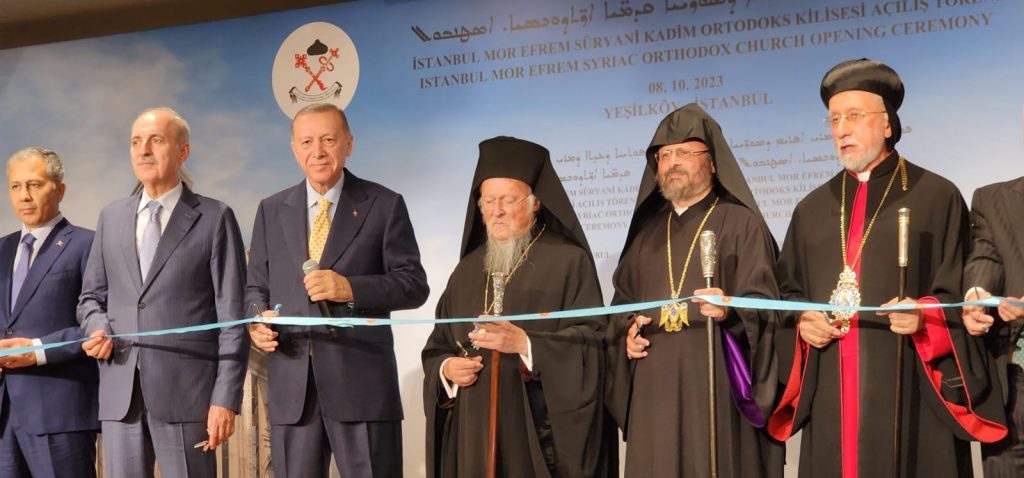
Τα επίσημα εγκαίνια έκανε ο Εξοχ. Πρόεδρος της Τουρκικής Δημοκρατίας κ. Recep Tayyip Erdoğan.
Παρέστησαν, επίσης, εκπρόσωποι των Χριστιανικών κοινοτήτων της Πόλεως, ο Σεβ. Καρδινάλιος Κούρτ Κοχ, Πρόεδρος του Ποντιφικού Συμβουλίου για την Προώθηση της Χριστιανικής Ενότητας, εκ προσώπου του Πάπα Ρώμης, Αξιωματούχοι του κράτους, εκπρόσωποι της Τοπικής Αυτοδιοικήσεως και πλήθος πιστών από την Συροϊακωβιτική Κοινότητα.

